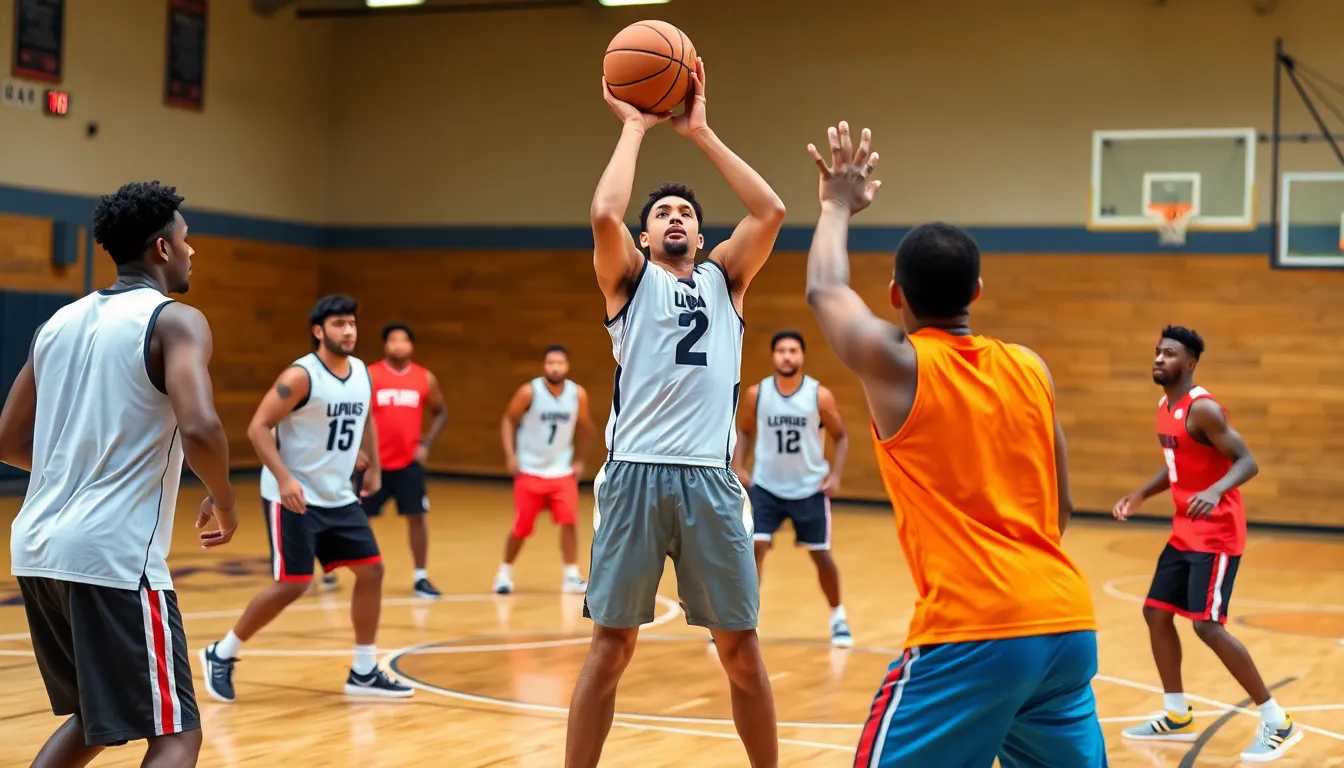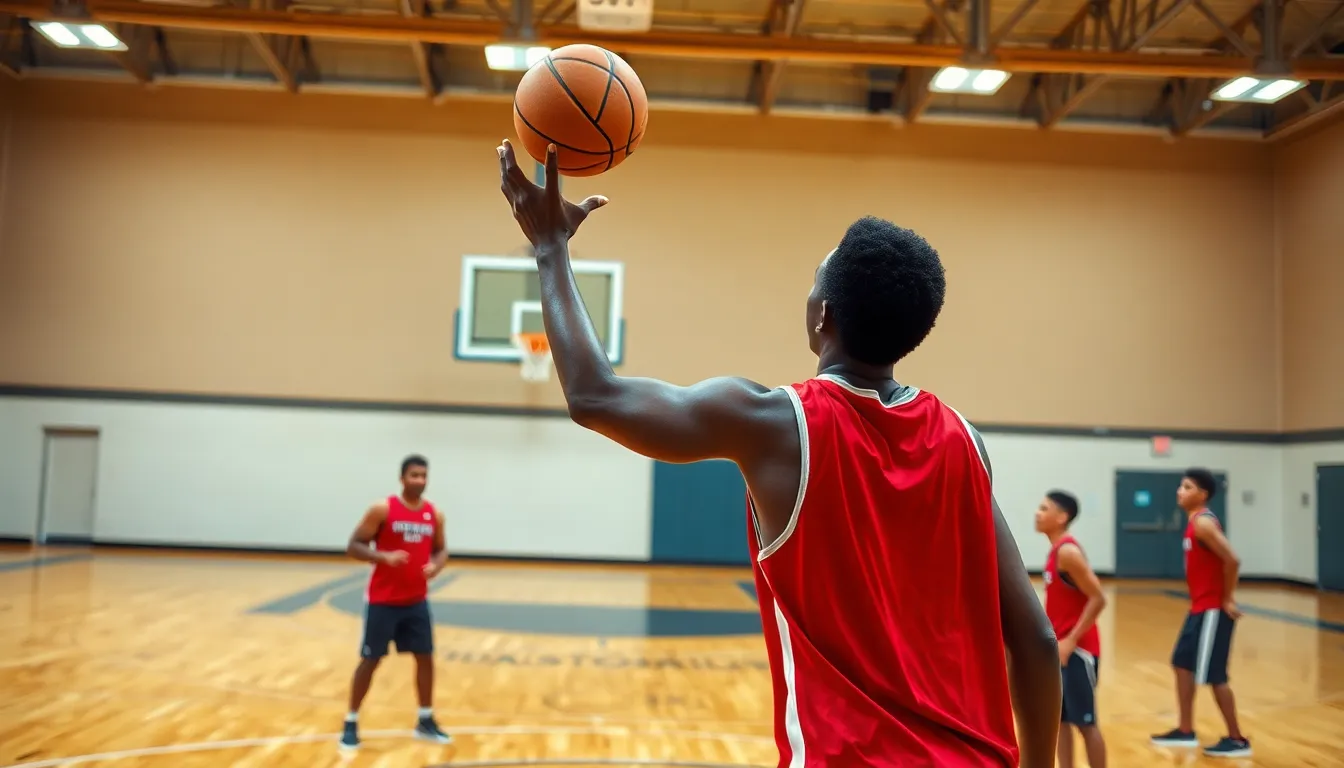Basketball isn’t just about fancy sneakers and slam dunks; it’s a game of skill, strategy, and a little bit of sweat. Whether you’re a seasoned pro or just learning to dribble without stepping on your own feet, mastering basketball practice drills can elevate your game faster than a fast break. These drills aren’t just about running in circles; they’re the secret sauce that turns average players into court legends.
Basketball Practice Drills
Basketball practice drills play a crucial role in skill development. They enhance shooting accuracy, ball handling, and defensive tactics, which are vital components of the game. Effective drills provide structured repetitions that lead to muscle memory, enabling players to perform under pressure during games. Players improve their decision-making skills as they navigate various game scenarios presented in drills.
Drills encourage teamwork and communication on the court. When executing certain exercises, players learn to work together to achieve common goals. Involvement in practice drills fosters a sense of camaraderie among teammates, enhancing team chemistry. Additionally, drills can be tailored to address individual weaknesses, allowing players to focus on specific skills needing improvement.
Consistency in practice is key to success in basketball. Regular engagement with drills helps maintain physical fitness and stamina, essential for competitive play. Emphasis on fundamentals during practice drills establishes a solid foundation that players can build upon throughout their careers. This foundational knowledge translates to improved performance in actual game situations.
Statistics suggest that players who regularly engage in practice drills experience marked improvement in their overall game. For instance, players focusing on shooting drills often see an increase in shooting percentage by 10-20% over a season. Engaging in diverse drills can also prevent injuries by promoting proper movement patterns and enhancing flexibility.
Ultimately, basketball practice drills are instrumental in developing well-rounded athletes. They equip players with the necessary skills, boost confidence, and prepare them for the challenges of competitive play. Embracing a rigorous practice routine sets the stage for success on the court, reinforcing the idea that dedication to practice directly correlates with performance.
Types Of Basketball Practice Drills

Various categories of basketball practice drills exist, each focusing on specific skills. Players benefit from incorporating these drills into their routines.
Offense Drills
Offense drills enhance players’ abilities to create scoring opportunities. Drills like pick-and-roll teach coordination between players. Fast breaks develop speed and decision-making under pressure. Isolation plays help players learn to create their own shots, fostering creativity on the court. Running through offensive sets prepares players for real-game scenarios, building teamwork and strategic thinking. These drills contribute to fluid ball movement and effective spacing, essential components of a successful offense.
Defense Drills
Defense drills sharpen skills like positioning, footwork, and anticipation. One-on-one drills emphasize staying in front of an opponent, improving lateral quickness. Closeout drills train players to contest shots effectively while maintaining balance. Shell drills develop team defensive concepts, emphasizing communication and rotations. Defensive rebounding drills focus on boxing out, ensuring possession after missed shots. Each drill cultivates a strong defensive mindset, crucial for disrupting opponents and enhancing overall team performance.
Shooting Drills
Shooting drills focus on accuracy and consistency. Form shooting reinforces basic mechanics, establishing a solid foundation. Spot shooting builds proficiency from various court locations, while off-the-dribble shooting enhances adaptability in different situations. Free throw drills emphasize concentration and routine, critical during high-pressure moments. Additionally, shooting against defenders fosters game-like conditions, allowing players to practice under pressure. Each of these drills contributes to effective scoring, crucial for success in games.
Conditioning Drills
Conditioning drills improve players’ physical endurance and agility. Sprinting drills build speed vital for fast breaks and defensive rotations. Interval training challenges cardiovascular fitness while simulating game intensity. Agility ladders enhance quick footwork, crucial for both offensive and defensive movements. Incorporating strength training into conditioning routines increases overall power on the court. Each conditioning drill prepares players for sustained performance throughout games, directly impacting their effectiveness and resilience.
Designing Effective Basketball Practice Drills
Effective practice drills require clear objectives. Players must understand their goals to focus their efforts during practice. Setting specific, measurable goals promotes accountability and motivation. Aiming for a percentage improvement in shooting accuracy can drive consistency, for instance aiming for a 10% increase over a season. Establishing fitness benchmarks helps in tracking progress as well.
Drills must align with each player’s skill level. Beginners benefit from basic drills that focus on fundamentals like shooting form and ball handling. Advanced players should engage in complex scenarios that emphasize decision-making and teamwork. Increasing difficulty as skills improve keeps players challenged and engaged. Also, incorporating varying types of drills fosters well-rounded development. Adapting practice to the individual ensures that every player maximizes their potential on the court, contributing to a stronger team overall.
Tips For Maximizing Practice Efficiency
Setting clear objectives drives focused practice. Players benefit from understanding specific goals for each session. Maintaining a structured schedule enhances consistency, with regular practice leading to measurable improvements.
Incorporating diverse drills prevents monotony. Variety keeps players engaged and enhances skill set when they face different situations. Building in competitive elements fosters a sense of urgency. Challenging teammates in drills can simulate game pressure, sharpening performance.
Focusing on fundamentals is crucial, especially for beginners. Mastering basic skills lays a solid foundation for advanced techniques. Players should identify individual weaknesses regularly to tailor their practice efforts. Regular assessments lead to targeted improvements.
Ensuring adequate rest is essential for recovery. Heightened performance occurs when players are physically and mentally fresh. Scheduling warm-ups and cooldowns helps to prevent injuries. Effective conditioning drills maintain fitness levels and enhance endurance.
Using feedback can elevate practice efficiency. Coaches and teammates should provide constructive input during drills. Immediate feedback helps players adjust their techniques on the spot, reinforcing correct actions.
Scheduling practice time effectively encourages disciplined habits. Short, intense sessions prove beneficial compared to lengthy, less focused practices. Planning drills that gradually increase in complexity maintains a steady challenge.
Overall, maximizing practice efficiency hinges on structured objectives, varied drills, and constructive feedback. Players find greater success through disciplined routines and by focusing on consistent progression in skill development.
Conclusion
Basketball practice drills are vital for players aiming to elevate their game. By committing to a structured routine that incorporates various drills, athletes can significantly enhance their skills and overall performance. The focus on specific areas such as shooting, ball handling, and defense ensures that players develop a well-rounded skill set.
Moreover, fostering teamwork and communication through drills creates a cohesive unit on the court. With dedication to consistent practice and a clear understanding of objectives, players can unlock their full potential. Embracing these principles not only boosts confidence but also prepares athletes for the competitive challenges ahead, making practice an essential component of basketball success.

